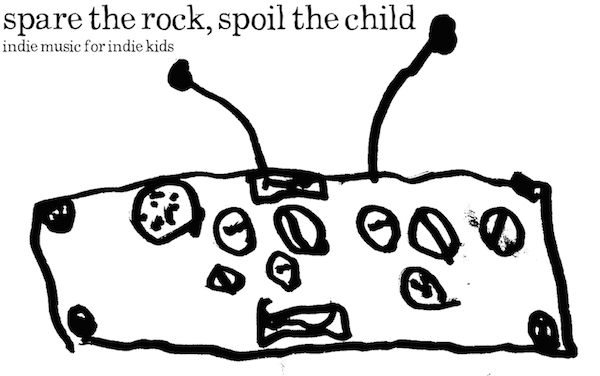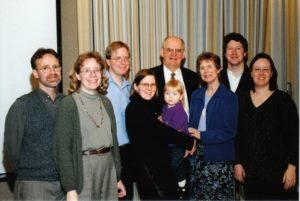Science Fair: “We don’t leave out half the world in any career — especially science.”
Jun 28
In addition to asking my mom to write something about the background of Science Fair, I also asked my sister Lisa, a scientist and lawyer herself, to do so. Here’s her amazing contribution:
Bill asked me to write something about our parents “as science education advocates and feminists.” That’s a little bit sweeping, of course, and, as usual, I put this in the important, but not urgent, quadrant of the Eisenhower matrix. That was June 1, and here it is, umm, later, and I’m gathering, from the notes I see on Facebook, that I should move it to the “important/urgent” quadrant.
Here goes.
I can remember road trips where Daddy would make up word problems for us to solve when the alphabet game grew tiresome, and my parents quietly worrying about a particularly bad geometry teacher (who was particularly mean to girls), and getting to skip third grade one day to lobby Oklahoma legislators to pass the Equal Rights Amendment, and a trip to the International Science & Engineering Fair my first go (and state science fairs, one of which was chaperoned by both grandmothers when my folks had commitments elsewhere), and statewide math competitions, and the famous chalkboard in the dining room. [i]
And I can remember my Granddaddy Hartrick taking me to spend the day checking on ‘his’ trees and showing me where a pileated woodpecker made its nest, and my Poppaw Childs taking me out to check on his cows and quizzing me about P:N:K ratios in fertilizer, and when he started worrying about the farm girls getting to college about as much as he did about the farm boys.
And I remember my Gralma Hartrick paying me a penny for every two planaria I transferred for her biological supply company, and how our first pets were planaria she sent my brother Mike for his birthday. (My mother had a deep-seated phobia of dogs, and my father was allergic to cats and birds, which didn’t leave much left over in those days.)
And my Granny Childs showing me how to can or sew, and applying her home economics and teaching degrees in feeding the five thousand, and Poppaw acknowledging that it was her algebra skills that got him his master’s degree in animal science.
And how proud we were to know that some of our immigrant relatives were sanctioned for going to door to door, politicking back when Flushing, Queens, New York was still Dutch.
And I remember stories of my brother Bill (or was it Mike?) running into the house, yelling, “Spider! Spider! We need to look it up!”
And I remember my mother telling me every year on my birthday (as part of my birth story), how she conspired with her doctor to lie about her due date so she could work at Phillips 66 into her third trimester.
And I remember the stories of our great-greats who were on the Underground Railroad, and were abolitionists in Ripley, Ohio (the same area where Eliza crossed the Ohio River in Uncle Tom’s Cabin, which is a really easy read – there’s a reason Abraham Lincoln described its author as “the little woman who wrote the book that started this great war!”), and then moved to Illinois to carry on the tradition. In fact, our great-great Rev. James Gilliland (photo here) pastored the Red Oak Presbyterian Church, and is credited with making it the center of the anti-slavery movement in Ohio. The Ripley, Ohio anti-slavery society there was founded in the 1830s.
And I remember how irritated Daddy would get at the Scientific Method, because that’s not how scientists do science. And when the press would describe the beginning of the universe as an explosion. And how proud he was of the Bartlesville schools introducing a gifted and talented program before they were common – the first high school graduates from that program featured a bumper crop of National Merit Semi-Finalists (including my brother Mike), and Daddy saw a causal relationship there. (My mom has told me that she thought Mike would have dropped out in 5th grade if that program hadn’t been there.)
And I remember being told by some high school girl as we were leaving AP English, “You’re liberal?! But, I thought you were smart!”
And I remember when the help wanted ads in the newspaper were sorted by gender. And when my high school counselor responded to my conceding that I didn’t know what I wanted to do when I grew up, by telling me that I should go to a state school in western Oklahoma, which had the 4th best pharmacy program in the US. Why? Because my skillset would be more portable, and I could go where my husband went for his job. (Not that it matters, much, now, but I wasn’t dating anybody at the time, and she left unexplained how I would meet somebody at this school who wasn’t a pharmacist.) And how concerned Eagle Forum was that men and women might have to share a bathroom, although I guess it was all right for them to share a bathroom at home.
And I remember my brother Bill taking on his third grade teacher on evolution, and her telling him that he was d—ned for believing in it. And him coming into the living room after his bedtime to kiss all the women goodnight who were working to do something about women’s rights.
And my mother talking about the work she did to abet integration in Fayetteville when she was in college, involving pie and coffee. (Fortunately, there was a reimbursement since she didn’t really have two nickels to rub together.)
So, it’s hard for me to write about science education advocates and feminists because, for me, that was what our family did and always has done. We think it important to work at making the world a better place, and one way to do that is to make sure that everyone in it has a voice, and that we don’t leave out half the world in any career – especially science. I’m glad that this CD is being used to further that ambition.
[i] An aside about the chalkboard: my mother’s folks also had unusual things in their dining room. They had a sawfish nose and a set of arrows tipped with curare that my great-grandfather brought back from a trip he had taken to Venezuela. As I heard the story from my uncle last week: after my great-grandmother died, he went down, more than once, to Venezuela to visit two of his children, who were missionaries there, working his way on boats. (In fact, my grandmother’s three siblings all made missionaries, in one way or another.) At some point, he fixed a motor for somebody, who gave him a very large sawfish in exchange. He couldn’t take the whole fish home, so he sawed off the nose.
So, maybe I can be excused for not realizing that our chalkboard décor was well outside the normal range of dining rooms.



Wonderful piece, great memories… How fortunate Ves and I were to have you three children in our family!
About the work in Fayetteville when I was in college: I was actually hoping to help end *segregation*. 🙂
And it truly never occurred to me, when I got the chalkboard so Ves could explain what he was doing at work, that this would be an unusual addition to the dining room. Perhaps that’s symbolic of something, that as a family we were always more concerned about how something would work, whether in the lab or in society, than with what it was going to look like. I get bored with hypotheses; I used to have a lapel button that read “When in doubt, do something.” For me, life is a lot more fun when I’m involved in something that produces an effect somewhere – at least as long as I don’t have to cook or run kids’ games.
Oops — that was an editing error on my part. Lisa had “abet,” which I changed to “end” because for some reason I read “integration” as “segregation.” I will fix that now.